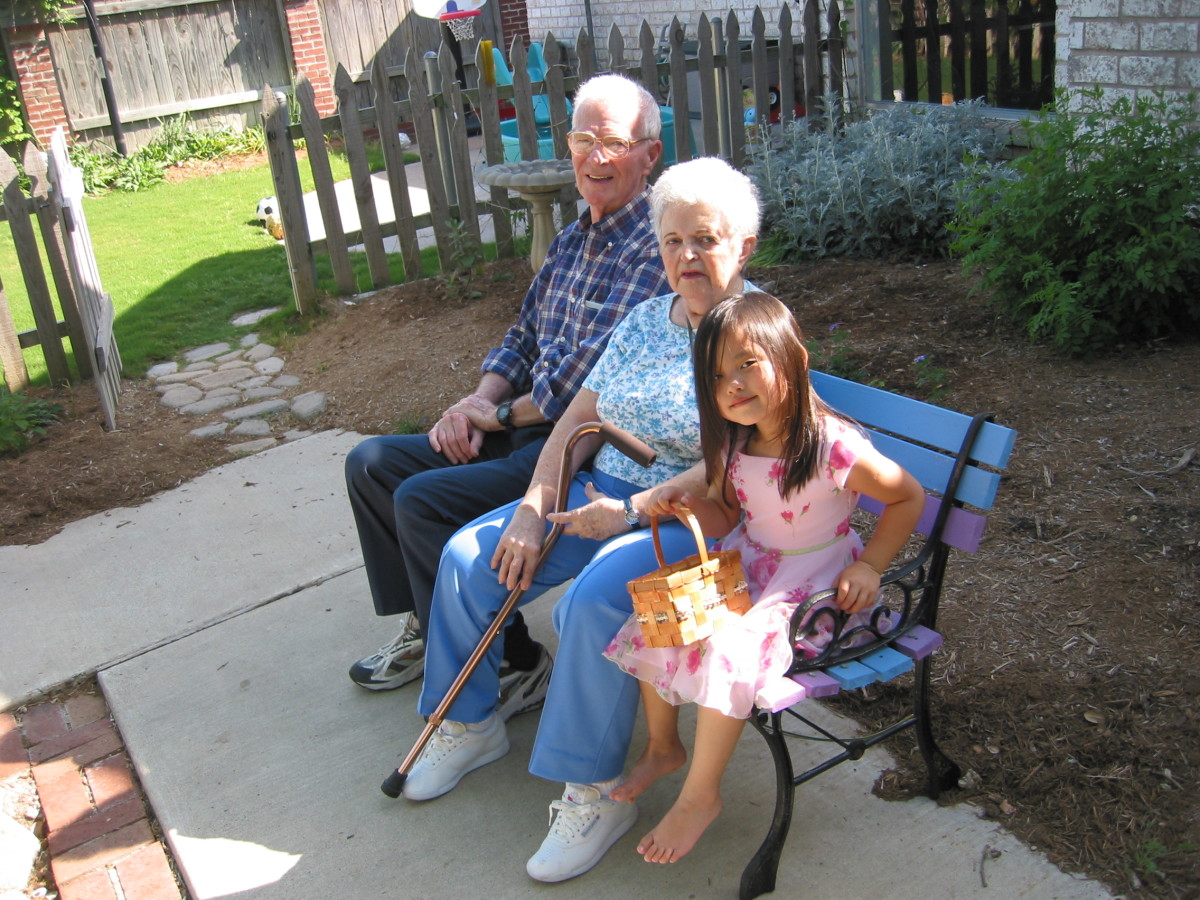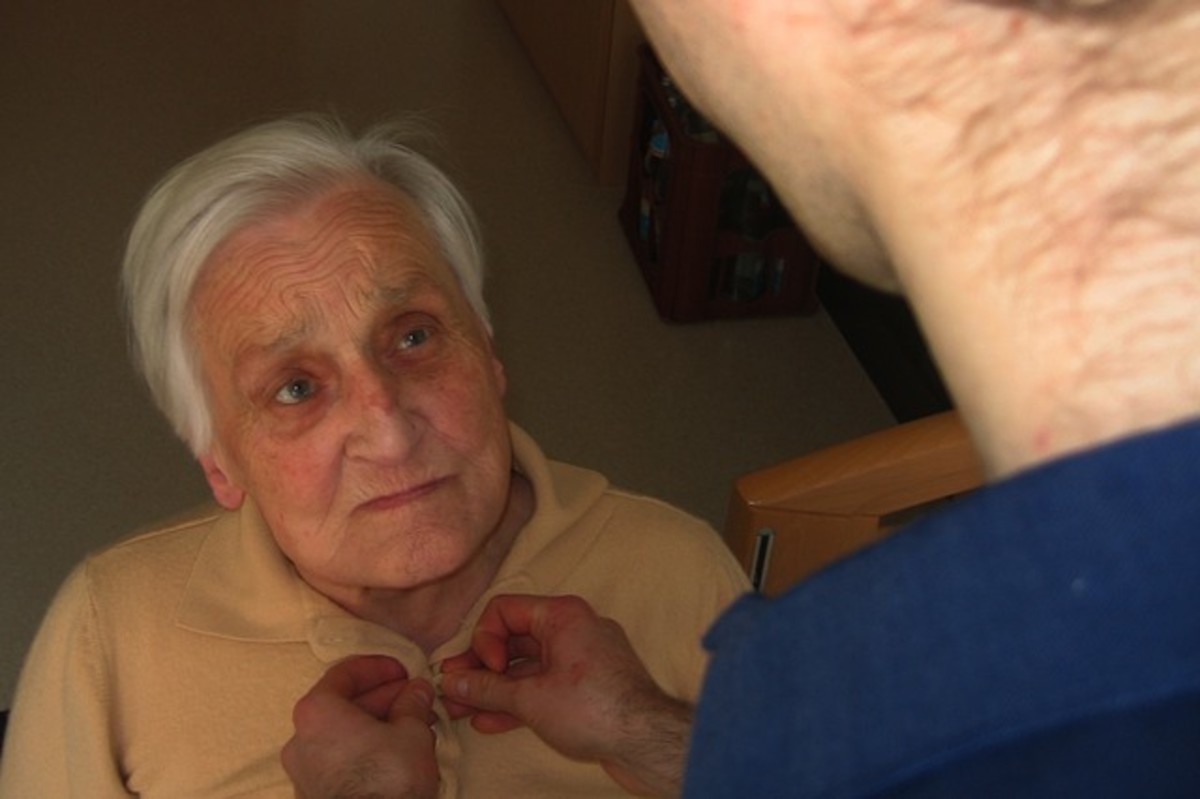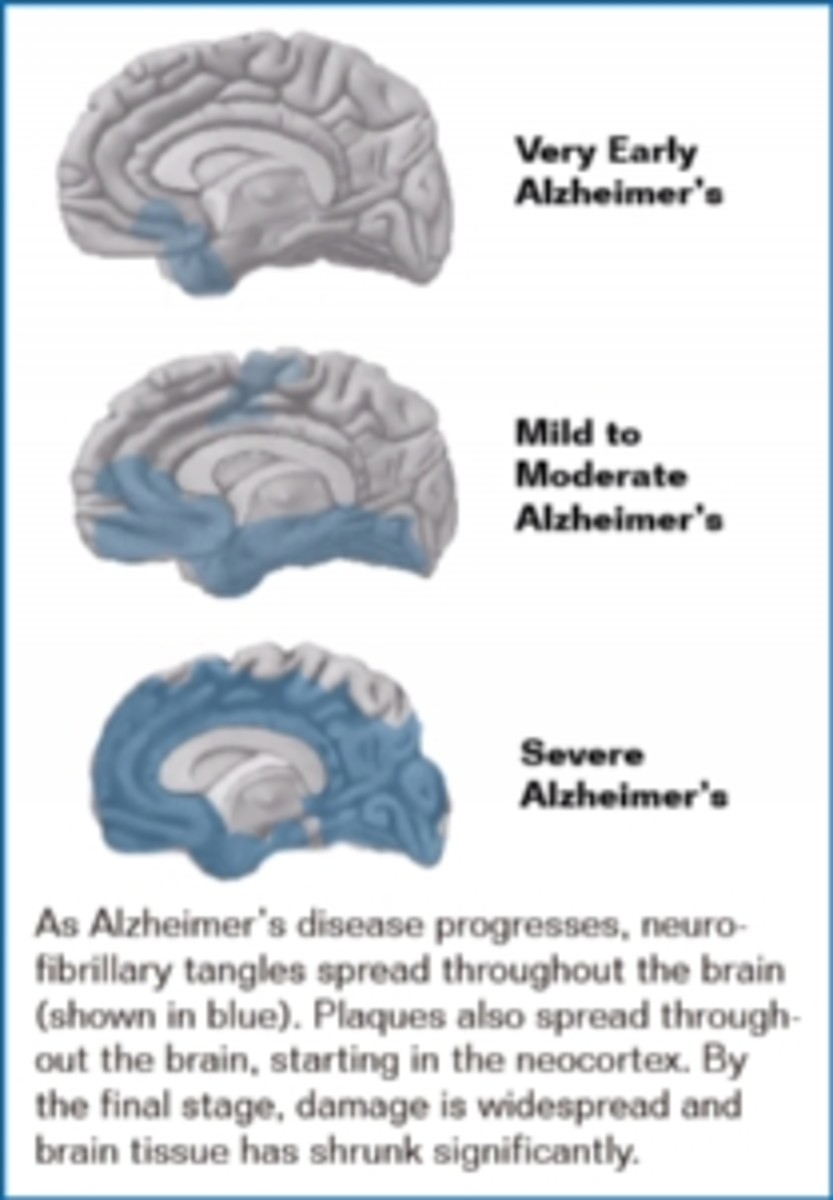Who Gets Alzheimer's Disease
Alzheimer Brains Look Different on Brain Scans
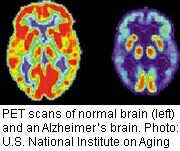
Alzheimer's and the Brain
Alzheimer’s diseaseis a progressive degenerative disorder that affects the cognitive functioning of previously highly functioning people. In 1906, Dr. Alois Alzheimer discovered that there were significant changes in the brain tissue of a woman who had memory loss, language dysfunction, and behavior that was unpredictable. Alzheimer brains are different than brains that do not have Alzheimer’s.
Brain tissue is filled with plaque, also known as amyloid plaques which are abnormal clumps, and fibers that are tangled, called neurofibrallary tangles. The amyloids seem to start in neocortex of the brain. There also is a loss of connections between the brain’s neurons, which are the nerve cells. As Alzheimer’s progresses, the tangles spread further throughout the brain, as do the amyloid clumps. As the disease gets worse, the damage causes the brain tissue to shrink significantly.
Science now believes the damage to the brain starts at least ten years or more before the problems begin to show up. The damaging changes start to show up in the brain long before the person is showing any symptoms. The plaque and tangles cause the neurons to work less efficiently. As neurons lose their ability to communicate with each other they become less and less functional. The hippocampus of the brain, where memories are formed, begins to be affected by the damage.
Monkeys Brains and Humans Brains

Alzheimer's and Monkeys
As science begins to understand Alzheimer’s they are learning that human beings get Alzheimer’s, and monkeys do not. When the brains of human beings and monkeys are analyzed under a microscope, it showed that the brains of older monkeys look very similar in the plaque buildup to humans who get Alzheimers. The difference is that monkeys do not get Alzheimers.
Scientists believe Alzheimers is caused by Abeta, a protein that builds up in the nerve cells of the brain This buildup contributes to memory loss that is associated with Alzheimer’s. The Abeta protein accumulated in similar locations and in similar amounts, but there were differences. Researchers used a chemical that doesn’t stick to Abeta lesions of primates. This may show that the lesions that cause Alzheimer’s are reacting differently in the brains of non humans.
Alzheimer’s begins subtly. It can start difficulty in remembering familiar people things and events. It may start with having trouble doing simple math problems. Often these issues occur in seniors and are not signs of Alzheimer’s, but sometimes they are. The difference is that Alzheimer’s get progressively worse. People forget how to do basic self care, or have difficulty changing television channels, until they get the to point that they can’t do anything for themselves. Memory lapses are not necessarily indicative of this serious and debilitating disease, but it may be wise to see your doctor.
Caring for People with Alzheimer's
Medical Checkup and Alzheimer's
A complete medical checkup by a physician can be done where they will do a physical, psychiatric, and neurological work up on the person. Medical history, including medications, prior physical illnesses, and diet are part of the evaluation done. Blood and urine tests, mental and memory tests, as well as language and problem solving tests are also done.
A cat scan of the brain may also be conducted. The checkup may uncover something else that is going on that is very treatable. Making slight adjustments to your nutritional needs, checking for thyroid problems, fevers, dehydration, reactions to medications, and minor head injuries may make a difference in improving mental acuity.
How you are doing emotionally is also something to be considered. Feelings of loneliness and sadness, anxiety, boredom, grief and stress can affect an elderly person differently than it did when they were younger. Changes and the distress that comes with it, can make anyone more forgetful.
If Alzheimer’s is the diagnosis, although upsetting, it allows the person afflicted to be part of the decision making. There are also advantages to be able to treat the symptoms when the disease is found earlier. There have been some advances in medicines that help delay the development of some of the symptoms of Alzheimer’s from mild to severe.
It is still not known what causes the disease and there is no cure. Research is showing that the
deterioration in the brain is related to semantic memory. This part of the brain has to do with the storage of facts and ideas and helps us remember and understand how things work.
Family History of Alzheimer's

Research Studies and Alzheimer's
Researchers in a study done by Hofstra North Shore - LIJ School of Medicine compared 70 people who had no memory problems, 27 people with Alzheimer’s, and 25 people with mild cognitive impairment (MCI), which often is indicative of the start of Alzheimers. All were requested to make judgments about size differences between two different objects. The theory was that the bigger the difference in size, the faster a participant would be able to answer the question. The research showed that people with Alzheimers, and those with MCI had more difficulty responding to the task as the size difference became smaller. When the size difference was huge, for example, when those surveyed were shown a picture of a tiny ant and a huge house, they easily distinguished which was bigger. When they were shown a giant ant and very teeny house, they were confused about which picture showed the larger object.
They more often than not answered the question incorrectly, or took longer to come to a conclusion. The researchers believe something is slowing down within the person and are looking at the problem being in the semantic memory.
Further studies will be conducted with these participants over time to take note if the semantic problems get worse as Alzheimer’s progresses.
Alzheimer's Develops Over Time
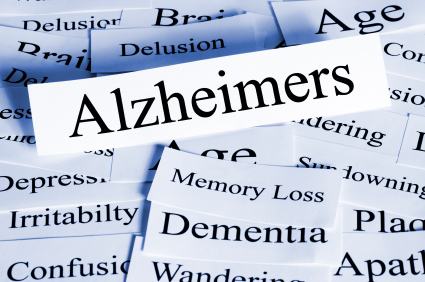
Warning Signs of Alzheimer's
According to the Alzheimer’s Association, there are ten warning signs of Alzheimer’s.
-
memory loss that interferes with the daily activities of living - forgetting important dates and recently learned information - needing to have the same information repeated again and again - becoming reliant on notes, and electronic reminders, or family members to remember events, when the person was previously able to handle this on their own.
-
difficulties in solving problems or strategizing about them. If notice that it is hard for the person to follow a recipe or pay their bills, that they are taking longer to do things, or taking longer to do them, this may be signs of the start of the progression of Alzheimer’s.
-
Alzheimer’s can start with simple everyday habits, like have difficulty remembering how to drive to familiar places, balancing their checkbook, or recalling the rules of games they like to play.
-
They can be confused with time and place. They may forget to lose track of the dates, which season it is, or how much time has passed. They may have conceptual problems with things that are not happening at this very moment. They may forget how they got where they are, or they may forget where they are.
-
Visual or spatial relationships may cause a person who is developing Alzheimer’s difficulty. The ability to judge distances or having difficulty reading, or discerning color and contrast may be symptoms of Alzheimer’s.
-
Problems with speech, difficulty in being part of a conversation or continuing a conversation, or repeating words, struggling with vocabulary, and descriptions of words may indicate the onset of Alzheimer’s.
-
Alzheimer’s may cause a person to misplace things and not be able to retrace their steps that would help them find it again. They may put things in unusual places and then accuse others of stealing from them.
-
Showing poor judgment with money, not being well groomed
-
Another symptom of Alzheimer’s is withdrawing from social activities, and hobbies.
-
Alzheimer’s may cause a person to be moody, depressed, suspicious anxious, and fearful. They may show signs of being upset at home and work, socially, and unfamiliar comfort zone.
Brain Stimulation Games for People with Alzheimer's
Poll About Family History and Alzheimer's
Do You Have a Close Blood Relative Who Has of Had Alzheimer's?
Family History and Alzheimer's
People who have Alzheimer’s Disease in their family may have a higher risk of being predisposed to getting the disorder themselves. Approximately 5.2 million Americans are afflicted with this disease, and this number is expected to rise dramatically as the baby boomers age. By 2025, the expectation may reach 7.1 million people with Alzheimer’s.
Duke University recently looked at the brain scans of over 250 adults who ranged in age from 55 to 89 years old. Some had cognitive and memory problems, some did not. In addition, the researchers looked for markers in spinal fluid and studied genes to help predict the onset of Alzheimer’s. Those who were at greater risk of developing Alzheimer’s seem to have a variation in the APOE gene. Those people who had a close relative like a parent or a sibling with Alzheimer’s disease showed silent brain changes. It seemed from the study, that nearly half of those who appeared healthy in the study who had a family history of Alzheimer’s met the criteria for early onset due to the results of the spinal fluid. 20% without family history met the criteria.
Science is learning that genetics are more clearly seen in early onset of Alzheimer’s. It is not as clear cut when Alzheimer’s comes on later, due to the complexity of genetics. Science doesn’t yet know when people start developing these silent brain changes. The study showed there is a correlation between having a family history of Alzheimer’s and these brain changes, but science doesn’t really understand yet, what this means, and they are not sure if this means these people will actually develop the disease also.
If you do have a family history, or not, it is important to be informed about Alzheimer’s. Starting today, make healthy lifestyle choices, do things you enjoy doing, keep your brain stimulated, and eat nutritiously.








